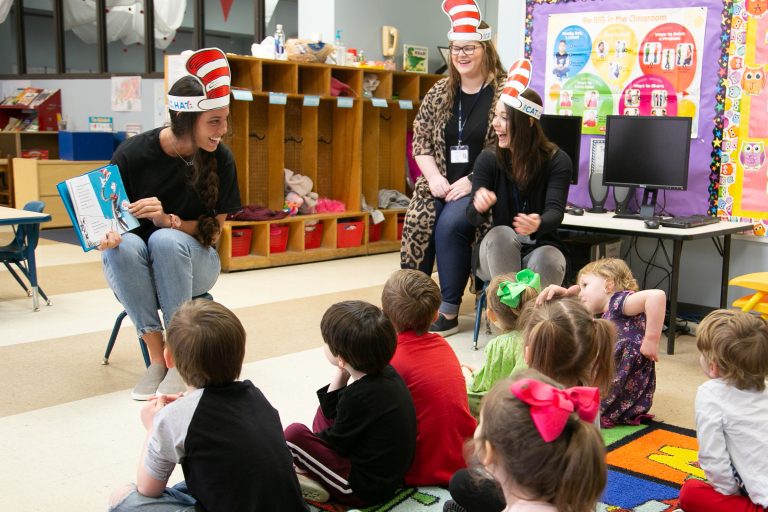Teacher Education at The W
How Do I Become A Teacher in Mississippi?
Education is one of the most rewarding fields of study. As an educator, you will touch many lives. You will not only encourage children to explore their dreams, but give them the tools to do so. The Mississippi Department of Education (MDE) is the only agency in the state which can grant Teaching Licenses. The School of Education at The W can help you meet the qualifications to become a teacher.
Early Childhood Development Elementary Education Secondary Education Alternate Route Licensure/MAT

What are the requirements to enter the Teacher Education Program at The W?
Below are the requirements to enroll in the Teacher Education Program at The W.
Students may apply to Teacher Education who:
- Have a cumulative 3.0 GPA or higher at the conclusion of the semester prior to their program's "methods" semester (e.g., for Elementary Education, at the conclusion of the Block 2 semester, before entering the Block 3 semester),
OR - who have earned a 21 or higher composite ACT score
OR - who have completed and passed the Praxis Core exam required by MDE.
This step is required to be recommended to MDE to complete any MUW undergraduate education program leading to licensure with the Mississippi Department of Education. Please see "Program Progression" for additional details. For students seeking licensure in another state, please see Licensure Reciprocity for more information.
Program Progression EPP Teacher Education Handbook (.pdf) Licensure Reciprocity Disclosure
Which education program should I choose?
We would strongly suggest you speak to your Academic Advisor or the School of Education Student Success Navigator to discuss the best option for you specific needs. We've included some general guidelines here.
Entering Freshman
If you are entering as a first-year student who does not have a bachelor's degree, we suggest you either apply to the Bachelor of Science in Elementary Education for K-6 teaching, or to teach at the secondary level, 7-12, or in a specialty discipline, you should enroll in a Bachelor's degree program with a Teacher Certification in the Secondary Education discipline area of your choice.
Transfer Students & Students After Sophomore Year
Due to the specific requirements of the traditional Teacher Certification program, students who Transfer to The W or decide to become a teacher in their junior or senior year may not meet all of the requirements to graduate in the typical four-years. For you there are two options:
Traditional Route - Students enter the Elementary Education or a Secondary Education bachelor's degree program and progress through to graduation, understanding that due to course rotations it may take an extra year to graduate. Students in this route will have more coursework in classroom management and teaching methods. These students will complete their student-teacher internship prior to graduating.
Alternate Route/MAT - Students enter into a standard bachelor's degree program in the discipline of their choice, then will take specific graduate courses in their senior year to complete the requirements for an Alternate Route teaching license. Students in this route will have more coursework in their content area. These students will complete their student-teacher internship while employed at a school, after graduating with their bachelor degree and completing the 3 required courses.
Students with a Bachelor's Degree
If you have already graduated with a bachelor's degree without a teacher certification and are interested in becoming a teacher, we suggest you apply to the Alternate Route pathway, and consider the Master of Arts in Teaching.
What are the different types of teaching licenses in Mississippi?
Class Levels of Mississippi Licenses
Class A = Bachelor’s level license
Class AA = Master’s degree level license
Class AAA = Specialist degree level license
Class AAAA = Doctorate degree level license
(Juris Doctorate and Master of Fine Arts Degrees are Issued at the Class AAA Level)
In general, the higher class level licenses command a higher salary. See the Teacher Salary Schedule from the Mississippi Department of Education.
Other limited and specialty licenses may be obtained from MDE. For more information on teacher licensure, we suggest reviewing Licensure Guidelines from the Mississippi Department of Education.
I already have a teaching license from another state and want to teach in Mississippi, what should I do?
Mississippi has agreements with other states to honor teaching license issued in another state, which you may qualify under. To learn more about reciprocity at the state level, please visit the MDE Reciprocity License page.
I want to teach in another state, what should I do?
Students seeking licensure in another state are advised to contact the appropriate licensing board in that state to determine specific requirements of guidelines for reciprocity in those U.S. states or protectorates. For a list of the state departments of education that oversee professional teaching licensure, please see the U.S. Department of Education website – State Contacts page.
What kind of support will I have along the way?
Unlike some universities, The W's School of Education has the tools, resources, and programs to support you at EVERY STEP of your career as a teacher.
As a student, you'll benefit from our knowledgeable faculty, world-class tutoring services, and dedicated Student Success Navigators.
As a new teacher, you'll rely on the Center for Educational Support to find programs specifically designed to meet the needs of new educators, and can help connect you with mentor teachers.
Throughout your career, we'll help you earn Continuing Education Units (CEUs) to stay informed on the latest teaching methods and invite you to workshops, institutes, and events. When you're ready to take the next step in your career, The W has Graduate Studies in Education.
And when the time is right, we hope you'll join us to mentor the next generation of teachers too.
All entering freshmen and transfer Elementary Education students will begin their major as Early Childhood Development. After completing Block 2 Education courses, students who have a 3.0 GPA on the most recent prior 60 credit hours OR who have earned a 21 or higher composite ACT score OR who have completed and passed the MDE Praxis Core exam may apply to become an Elementary Education major if interested.
The W's Early Childhood Development (ECD) degree program is designed to train entry-level early childhood education leaders. The curriculum aligns with National Association for the Education of Young Children (NAEYC) standards and is designed to promote high-quality early learning for all young children, birth through age eight, by connecting early childhood practice, policy, and research with quality instruction.

Why do Education majors start in Early Childhood Development?
There are several reasons why we believe starting in the Early Childhood Development major is beneficial to our students.
- Students enrolled in any PRE-professional majors are not eligible for federal financial aid. (The same is as true for pre-med, pre-law, or pre-nursing majors as it is for pre-education.)
- Students enrolled in a specific major are more likely to graduate, and graduate on-time, compared to undeclared/undecided students.
- The first semesters of the ECD major align with the requirements for the Elementary Education degree program, allowing you to seamlessly change your major when you meet the qualifications.
- The requirements for teacher licensure are incredibly strict. Students may not learn they will not meet the requirements to graduate in Education until the middle of their junior year. The ECD program allows students with a passion for teaching to graduate on-time and continue into a rewarding career.
This guide is to help you see when in the Elementary Education program you will take specific courses, which may be helpful when planning your schedules. The four "blocks" in which Elementary Education students take their ED courses are listed below. A minimum grade of C (B for ED 302) is required for ALL courses.
Block I
ED 302, ED 306, ED 311, & ED 361 must be taken together.
| ED 200 - Education as a Profession | ED 311 - Elementary Residency 1 |
| ED 302 - Art and Science of Teaching (minimum of B required) |
ED 304 - Principles of Early Childhood Learning |
| ED 306 - Introduction to Exceptional Learners | ED 361 - Early Literacy Instruction I |
Block II
ED 362, ED 365, and ED 367 must be taken together.
| ED 362 - Early Literacy Instruction II | ED 390 - Classroom Management |
| ED 365 - Content Area Reading | ED 360 - Educational Psychology |
| ED 367 - Elementary Residency 2 | ED 297 - Instructional Technology I OR Computer Class OR Math above MA 113 |
Apply to Teacher Education Program
Elementary Education who meet the above requirements will apply to the Teacher Education Program at the conclusion of the Block II semester, before entering the Block III semester.
Block III
ALL must be taken together; must be accepted into “Teacher Education Program” to take these courses.
| ED 405 - Teaching Mathematics in Elementary and Middle Schools | ED 434 - Methods for Teaching Reading and Language Arts in Elementary and Middle Schools |
| ED 410 - Teaching Social Studies in Elementary and Middle Schools | ED 435 - Elementary Residency 3 |
| ED 412 - Teaching Science in Elementary and Middle Schools | ED 466 - Reading Assessment and Intervention |
Block IV
Must be taken together; must complete the Internship Application by the due date & be accepted to register for these courses
| ED 406 - Teacher Internship: Elementary | ED 452 - Educational Measurement |
Secondary Education (7-12) and Specialty Programs (K-12)
Students in a Secondary Education (7-12) or Specialty (K-12) program enroll in a degree program with Teacher Certification in the College of Arts & Sciences. The students will take content courses through their home department and teacher education courses through the School of Education. Specialty programs at The W include: Music Education, Spanish Education, and Theatre Education. The secondary education programs included at The W are: English, History/Social Studies, Mathematics, Biology, and Physical Science Education (chemistry & physics).
When to Apply to Teacher Education
Students MUST apply for and be accepted into Teacher Education BEFORE taking any internship or materials & methods courses.
These courses include:
- ED 407 (K-12)/409 (7-12) Observation & Directed Teaching
- ED 452 Educational Measurement
- EN 410 Methods & Materials in Secondary English
- FL 410 Methods & Materials in Secondary Language
- HIS 410 Methods & Materials in Secondary History & Social Studies
- MA 319 Materials & Methods in Secondary Mathematics
- BSB 313 Methods & Materials in the Teaching of Science (Biology)
- PS 313 Methods & Materials in Physical Science (Chemistry)
- MUS 325 Secondary Music Methods
- TH 207 Creative Dramatics

How to Apply to Teacher Education
- Background check through Verified Credentials with a clear background verification
- Completed ED 200: Education as a Profession with a grade of “C” or higher
- Completed ED 302: Art and Science of Teaching with a grade of “B” or higher (can only be taken twice to obtain the grade of “B” or higher)
- Overall GPA of 2.75 or higher on a minimum of 44 semester hours
- Composite score of 21 or higher on the ACT OR passing Praxis Core scores (Reading 156, Writing 162, and Math 130) OR a MUW transcribed GPA of 3.0 or higher for the previous 60 credit hours
Courses Taken Together
ED 302 & ED 306 must be taken together. See "Recommended Course Progression" concerning when to take them.
ED 407/409 & ED 452 must be taken together. They are taken during the final semester in the program.
Recommended ED Course Progression
ED 300 & ED 360 (together or separate)
ED 302 & ED 306 (MUST be taken together)
ED 365
ED 390 & Materials & Methods Course (together or separate)
ED 407, 409 & ED 452 (MUST be taken together)
Application for Teacher Internship
Instructions for applying for teacher internship are emailed to appropriate advisors each semester by Ms. Brittany Hunnicutt. It is the advisor's responsibility to get those instructions to eligible students immediately, so that they can get it completed by the deadline. Instructions are typically sent in March & October with deadlines in April and November, of each respective semester.
Field Experience
Teacher candidates in 7-12/P-12 education programs have the following field experiences, and they are obtained by the course instructor:
- ED 302: minimum of 10 hours
- ED 306: minimum of 10 hours
- ED 365: minimum of 10 hours
- Materials & Methods course: varies by major
- ED 407,409: minimum of 60 full days
The School of Education offers an alternate route initial licensure for students who are interested in teaching, but did not start a Teacher Certification program early in their college career or who become interested in teaching following graduation. The Master of Arts in Teaching (MAT) is a graduate education degree and an alternative initial licensure program which provides those who complete this program an opportunity to teach in Mississippi schools. Some students may qualify to be admitted to the Accelerated MAT program while completing their bachelor’s degree. Students who meet the above Teacher Education requirements and have earned a bachelor's degree in their discipline area may apply to the MAT program as a graduate student.

How the Mississippi Alternate Route License Works
- Students who meet the minimum qualifications apply to the School of Education's MAT Program.
- The student passes the Praxis II Subject Area Assessment for their discipline (see list below)
- The student must take three graduate-level courses:
- ED 538: Understanding Individual Learning Differences
- ED 549: Instructional Assessment Practices and Procedures
- ED 551: Managing the Instructional Environments
- After completing the three courses, the student then qualifies to apply for a 3-year, non-renewable Mississippi Educator license.
- The student-teacher is hired by an accredited school to teach grades 7-12 in their discipline.
- While employed as a full-time teacher, the student enrolls in ED 697 for 6 credit hours as their Student-Teacher Internship.
- Upon completing the 6 credit hour internship, the student-teacher is eligible to apply for the 5-year, renewable, Class A Mississippi Educator License.
- The student is encouraged to complete the remaining 15 credit hours to earn their Master of Arts in Teaching and become eligible for the Class AA Mississippi Educator License.
Alternate Route Initial Licensure
MUW seniors who have completed 90 credit hours toward their degree with a 2.75 GPA in an approved degree program may apply to the Alternate Route Initial Licensure Program. Students admitted to the program can take up to 6 hours of specific graduate Education courses in their senior year.
In the term following graduating with their bachelor's degree, students take one additional class to complete the requirements for a non-renewable Mississippi Educator license, which is good for three years. While employed at an accredited 7-12 school, students will complete the student-teacher internship to earn the 5-year, renewable, Class A Mississippi Educator License.
Students may then complete the remaining 15 hours of graduate coursework while teaching to earn the Master of Arts in Teaching and become eligible for the Class AA Mississippi Educator license.
Accelerated Bachelors/MAT Program
MUW juniors who have completed 75 credit hours toward their degree (including 24 hours at The W) with a 3.25 GPA in an approved degree program may apply to the Accelerated Bachelors/MAT Degree Program. Students admitted to the program can take up to 12 hours of specific graduate Education courses in their senior year which apply to both their bachelors degree and a Master of Arts in Teaching.
Upon completing their bachelors degree, the student qualifies for the the non-renewable Mississippi Educator license, which is good for three years. While employed at an accredited 7-12 school, students will complete the student-teacher internship to earn the 5-year, renewable, Class A Mississippi Educator License.
The student applies to enter the MAT graduate program to complete the remaining 12 hours toward their Master's degree and become eligible for the Class AA Mississippi Educator license.
Master of Arts in Teaching Graduate Program
Students with a bachelor's degree from any accredited college or university in an approved degree program may apply to the Master of Arts in Teaching degree program through the Office of Graduate Studies. Thirty hours are required for a Master of Arts in Teaching degree.
Students will complete the three required courses to earn the non-renewable Mississippi Educator license, which is good for three years. Students will be hired by an accredited 7-12 school, where they will complete the student-teacher internship to earn the 5-year, renewable, Class A Mississippi Educator License.
MAT students must have been employed by a Mississippi school district for one year prior to completion of the degree program. Upon successful completion of the 30 hours in the program, candidates will be eligible for a Class AA Mississippi Educator license.
These are the MUW approved Praxis II Subject Area exams that can be passed for admittance into the MUW MAT program.
| Subject Area | Praxis II Test Code (click the code to register) |
Mississippi Endorsement Code |
|---|---|---|
| Art, K-12 | 5134 | 124 |
| Biology, 7-12 | 5236 | 125 |
| Business Ed, 7-12 | 5101 | 126 |
| Chemistry, 7-12 | 5246 | 129 |
| Economics, 7-12 | 5911 | 138 |
| English, 7-12 | 5038 | 145 |
| Foreign Languages, K-12 | Chinese 5665 French 5174 German 5183 Spanish 5195 |
Chinese 130 French 148 German 150 Spanish 178 |
| Health Ed, K-12 | 5551 | 152 |
| Home Economics, 7-12 | 5122 | 153 |
| Library Media Specialist, K-12 | 5312 | 155 |
| Marketing, 7-12 | 5561 | 159 |
| Mathematics, 7-12 | 5165 | 157 |
| Music, K-12 | 5113 | 163 |
| Physical Education, K-12 | 5091 | 168 |
| Physics, 7-12 | 5266 | 169 |
| Social Studies, 7-12 | 5081 | 184 |
| Speech Communication, 7-12 | 5221 | 180 |